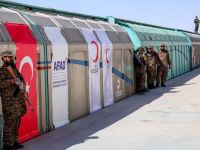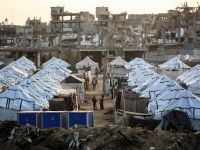More than 1,500 key Africans gather here Sunday in a bid to step up Africa's struggle against AIDS and persuade its leaders to make fighting the disease their top development priority.
"It is a unique initiative to bring African leaders together to forge consensus on an African-owned, African-led response," one of the organizers of the Addis Ababa "interactive forum" said.
The gathering aims to break a law of silence and rejection around the deadly disease, and to attack practices and taboos which have existed to date, and which critics say have fostered its spread.
"The interactive aspect of the forum will help to break the heavy silence with which African leaders have reacted when confronted with the threat of the pandemic," said one of the organizers, who resist the idea that they have merely organized "yet another AIDS conference."
Africa is the continent the worst hit by the disease, but also the one which has provided the least adequate response.
AIDS has killed 2.4 million Africans in 2000 alone and currently affects more than 25 million in sub-Saharan Africa. The United Nations reckons it will create 40 million African orphans in the next 10 years.
The Addis Ababa gathering is being seen as a new launch pad to renew commitment to more highly concerted action against the pandemic in Africa.
The forum between Sunday and Thursday involves the United Nations Economic Commission for Africa, the United Nations organization fighting the disease UNAIDS, the UN development program, the UN children's organization UNICEF, the World Bank and private participants.
It has made its motto: "AIDS: the greatest leadership challenge."
AIDS sufferers will be among those present.
Top figures attending include Presidents Festus Mogae of Botswana, Paul Kagame of Rwanda, Yoweri Museveni of Uganda, Negasso Gidada of Ethiopia, plus UN Secretary-General Kofi Annan.
The UN African Commission says a major task of the forum will be "commitments from African leaders and their development partners to make HIV/AIDS a top priority on the development agenda and to invest fully in the fight."
A UN study published last month said Africa would need between two and 10 billion dollars in foreign aid annually towards efforts to try to contain the spread of AIDS.
A message by South Africa's former president Nelson Mandela will be played at the opening. South Africa is the country with the world's highest rate of HIV and AIDS sufferers.
Those expected to attend also include Malawi Vice-President Justin Malewezi, Prime Ministers Meles Zenawi of Ethiopia, Moustapha Niasse of Senegal and Nagoum Yomassoum of Chad, UNICEF Executive Director Carol Bellamy, UN development program adminstrator Mark Malloch Brown, UNAIDS executive director Peter Piot, Salim Ahmed Salim, secretary-general of the Organization of African Unity, and K Y Amoako, executive secretary of the UN Economic Commission for Africa.
© 2000 Al Bawaba (www.albawaba.com)







